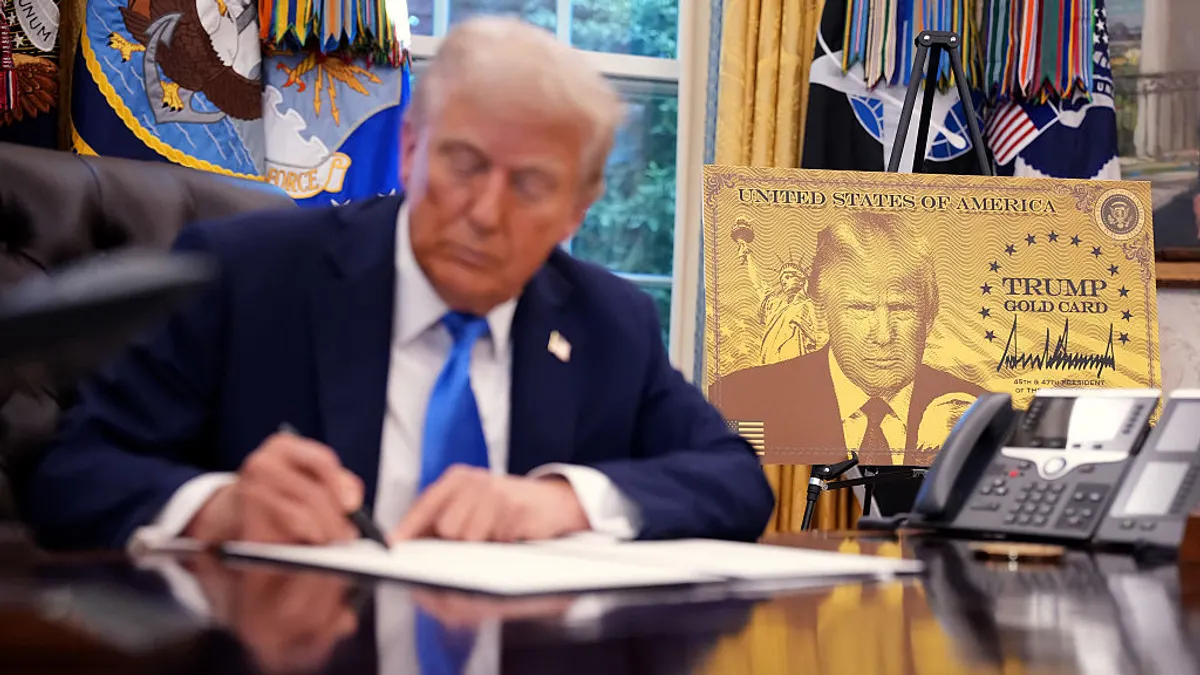Buy American — its sounds great, right? After all, what's wrong with requiring businesses, especially those using federal dollars, to spend their money here at home? As it turns out, some construction industry groups claim the rules intended to help American manufacturers and suppliers could be hurting construction companies as part of the deal.
Current regulations in place
There are three main Buy America laws currently in effect, each with its own purchasing restrictions targeting projects using federal funds.
Buy American Act of 1933
The Buy American Act of 1933, established during the Great Depression, was the first to restrict sourcing of products to those made in America. The original provisions have been updated over the years, according to Scott Berry, director of the Associated General Contractors of America's utility infrastructure division, environment and trade.
As it stands today, the act's definition of American-made requires that "51% of the constituent components of a given product have to be made in America." The product must also be "substantially transformed" in some way by American labor, meaning that the product must undergo some kind of change in this country, whether it be form or shape, Berry said.
He added that all products and services purchased by the federal government must comply with the Buy American Act of 1933. However, the U.S. is a signatory to the World Trade Organization's Agreement on Government Procurement (GPA), which allows signatory countries to treat products made in other GPA countries as being made in their own, as long as the contract in question meets a minimum value threshold. For example, a U.S. company can activate this feature of the GPA if its federally-related contract is worth $5 million or more.
Surface Transportation Assistance Act of 1982
However, Buy America, a provision of the Surface Transportation Assistance Act of 1982, is much stricter. As the name suggests, this law applies to projects funded by the Department of Transportation (DOT) and usually involves the purchase of iron and steel, although it also covers manufactured goods as well. In this case, the definition of American-made, although not specified in the original Act, means 100% of all components, products and processes have to originate in the U.S, according to Berry.
For example, steel must be melted, poured, shaped and coated in the U.S. There are fewer than 11 such American facilities, also called integrated steel mills, which can do this kind of end-to-end production, said Berry. All of these mills are east of the Mississippi River, Berry said, and not all of them produce construction materials. This effectively eliminates the option of using many of the exact same steel products from the country's numerous "slab reheater" facilities because the reheated steel comes from a variety of sources, including other countries, Berry noted.
The Buy America rule also precludes DOT transportation projects from utilizing GPA partner products. This, Berry said, is because DOT projects are considered "sub-federal," or owned and administered by state government and local governments, which are not bound by international trade law. However, even if they were party to those agreements, the GPA excludes transportation projects.
EPA regulations
The Environmental Protection Agency's State Revolving Fund American Iron and Steel (AIS) Requirement, the third Buy America rule currently in effect, applies to certain products, like manhole covers, required for public water and treatment systems. The American Recovery and Reinvestment Act of 2009 also contains American-made requirements but applies only to projects funded by the Act. Berry added that the vast majority of those projects are complete.
The popular 'pro-America' message
Because definitions of "American-made" are regulatory and not legislative, Berry said their scope could be changed at any time to allow more sourcing of foreign products or, as in the case of slab reheaters, to ease up on the regulations to allow more products manufactured in the U.S. to qualify as American-made. But don't count on that happening any time soon, as the popularity of being "pro" American goods feeds into the message that that the country's politicians, as well as the public, have bought into, according to Berry.
"It's very politically appealing," but the rules "ignore the global supply chain that exists in a 21st century world," he said. Berry added that the intentions behind the bills clearly aim to give preference to American goods, but this principle of protectionism is an outdated economic theory. "The economy no longer looks like it did after World War I, and it's never going back there," he said.
Do the rules negatively impact US construction companies?
Berry said he believes these rules also ultimately hurt U.S. companies. As in the case of integrated steel mills versus slab reheating operations, the laws tag one company as being "more American," pitting those workers against each other. In addition, he said, if a West Coast company needs to buy steel for a transportation project, its only option is to use an integrated mill across the country, resulting in increased costs as well as additional carbon emissions from shipping.
The rules also have the potential to stop projects in their tracks. Recently, developers of a proposed high-speed rail system from Las Vegas to Los Angeles announced that they abandoned a deal with a Chinese partner and financial backer after officials rejected their plans to use Chinese-made cars.
Attorney Erik Ortmann, partner at Kaufman Dolowich & Voluck in New York, said there is an exception to the 100% American-made rule for transportation projects when it comes to "rolling stock" items like rail cars, but the rules still require such items to be more than 60% American-made, with final assembly taking place in the U.S.
Berry said that perhaps the most costly aspect is how these rules affect America's trade relationships with other countries. If the U.S. doesn't buy Canadian products for transportation projects, for example, then the natural evolution, is for Canada to restrict the purchase of American products. Apply this scenario to every other country that the U.S. can't buy from, and things look pretty bleak for American companies that want to sell their products or services to foreign markets, according to Berry.
The 'complex regulatory morass' of compliance
Contractors' cost of compliance with this "incredibly complex regulatory morass" of Buy America rules is also an AGC concern. Construction companies must figure out which rules apply to them with each project because their obligations change depending on the type of work they do. To avoid running afoul of the myriad regulations, many firms hire outside legal counsel, driving up their costs even further. "It definitely is a big administrative headache," Berry said.
Ortmann said compliance is key, particularly when it comes to obtaining supplier and manufacturer certifications that the products or materials were in fact made in the U.S. In that respect, Ortmann pointed to the case of New York City's Second Avenue Subway project. The Metropolitan Transportation Authority had to rip out and replace a fire suppression system after the Federal Transit Administration determined some of the system components originated in Finland. This occurred despite the fact that the contractor provided the MTA with certification that it was an American-made system that met transportation project requirements, according to the FTA.
Anyone can apply for a waiver of the Buy America rules, but the successful applications have to show strong arguments in relation to public interest, availability and price differential, according to Ortman. The application must speak to all of these factors. "It doesn't play well to just say, It costs more.' That isn’t an excuse," he said.
Will the rules change in the future?
Berry said his ideal situation would be if there were no domestic sourcing laws at all, "but that's never going to happen." He said the Buy American concept is "incredibly popular" and has too much political support, even when considering its possible negative ramifications.
Barring a complete elimination of American-made requirements, Berry said a standard set of rules would keep contractors from having to develop separate supply chains and track American-made rules from project type to project type. "That," he said, "would be the next best thing."





















